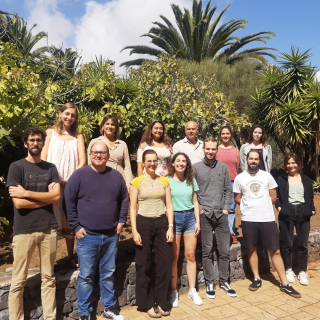Bibcode
Kourkchi, E.; Khosroshahi, H. G.; Carter, D.; Karick, A. M.; Mármol-Queraltó, E.; Chiboucas, K.; Tully, R. B.; Mobasher, B.; Guzmán, R.; Matković, A.; Gruel, N.
Bibliographical reference
Monthly Notices of the Royal Astronomical Society, Volume 420, Issue 4, pp. 2819-2834.
Advertised on:
3
2012
Citations
25
Refereed citations
24
Description
We present the study of a large sample of early-type dwarf galaxies in
the Coma cluster observed with DEIMOS on the Keck II to determine their
internal velocity dispersion. We focus on a subsample of 41 member dwarf
elliptical galaxies for which the velocity dispersion can be reliably
measured, 26 of which were studied for the first time. The magnitude
range of our sample is -21 < MR < -15 mag.
This paper (Paper I) focuses on the measurement of the velocity
dispersion and their error estimates. The measurements were performed
using penalized pixel fitting (PPXF) and using the calcium triplet
absorption lines. We use Monte Carlo bootstrapping to study various
sources of uncertainty in our measurements, namely statistical
uncertainty, template mismatch and other systematics. We find that the
main source of uncertainty is the template mismatch effect which is
reduced by using templates with a range of spectral types.
Combining our measurements with those from the literature, we study the
Faber-Jackson relation (L∝σα) and find that
the slope of the relation is α= 1.99 ± 0.14 for galaxies
brighter than MR≃-16 mag. A comprehensive analysis of
the results combined with the photometric properties of these galaxies
is reported in Paper II.
Related projects

Traces of Galaxy Formation: Stellar populations, Dynamics and Morphology
We are a large, diverse, and very active research group aiming to provide a comprehensive picture for the formation of galaxies in the Universe. Rooted in detailed stellar population analysis, we are constantly exploring and developing new tools and ideas to understand how galaxies came to be what we now observe.
Anna
Ferré Mateu